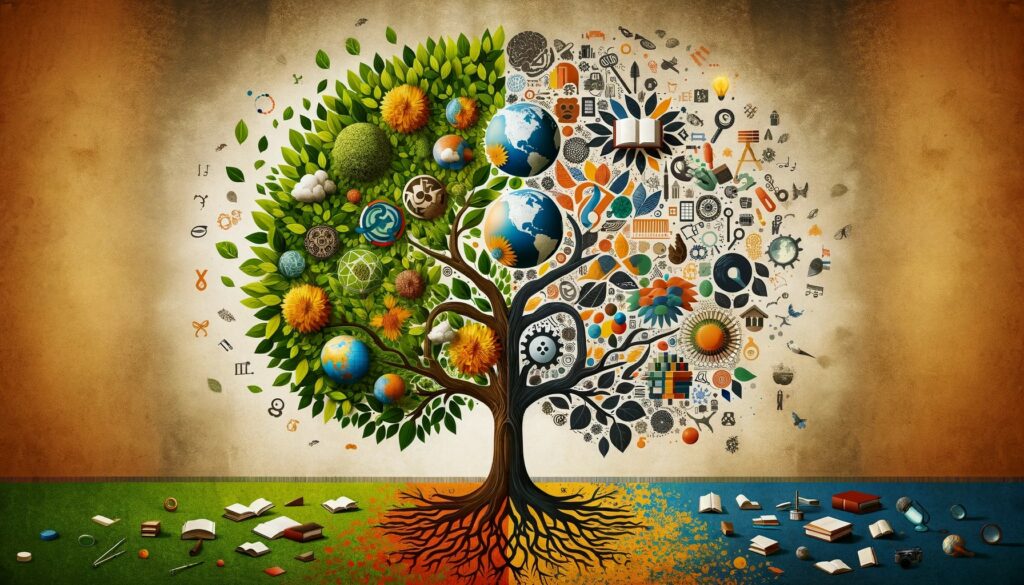I’ve always been fascinated by the classic debate of nature versus nurture. It’s a question that has puzzled psychologists, philosophers and laymen alike for centuries: are we shaped more by our genetic blueprint or by our surroundings?
Diving into this topic, it becomes clear that it’s not as black and white as you’d initially think. There’s no denying that both nature (our genes) and nurture (our environment) play significant roles in shaping who we are. The key lies in understanding how these two forces interact and influence each other.
To really get to grips with the nature vs nurture debate, I’ll be tackling questions like: How much of who we are is ‘hardwired’? How does our environment shape us? And where does the line blur between what’s innate and what’s learned? As we delve deeper, I hope to unravel some answers to this age-old puzzle.
Understanding the Concept: Nature vs Nurture
Let’s dive right into the heart of one of psychology’s biggest debates – nature versus nurture. This age-old argument questions whether our behaviors and traits are a result of our genes (nature) or our experiences and environment (nurture). It’s a fascinating topic that has sparked countless conversations among psychologists, researchers, scientists, and even everyday individuals.
Take for example, intelligence. Some may argue it’s all in your DNA – you’re either born smart or you’re not. That’s the nature aspect coming into play. Others might say that intelligence is shaped by factors such as education, upbringing, and exposure to stimulating environments – this is where nurture steps in.
The same debate applies to various attributes like personality traits, physical appearance, mental health issues etc. Is your outgoing personality because of genetics or because you were encouraged to socialize from a young age? Are you prone to anxiety due to inherited genes or is it because of traumatic life events? The answers aren’t always black or white.
Consider these statistics:
- According to studies on identical twins raised separately, around 70% of IQ variance can be attributed to genetic differences.
- Yet other research indicates that environmental factors account for roughly 60% of personality traits.
| Genetic Influence (%) | Environmental Influence (%) |
|---|---|
| Intelligence: 70 | Intelligence: 30 |
| Personality Traits: 40 | Personality Traits: 60 |
It seems clear then that both nature and nurture have significant roles in shaping who we are. It’s perhaps less about one versus the other but rather an intricate interplay between the two forces at work throughout our lives.
With ongoing research and new scientific advancements being made every day, I’m sure we’ll continue uncovering more insights about this captivating topic – nature vs nurture.
The Role of Genetics in Personality Development
Diving right into the heart of the matter, it’s imperative to consider how our genetic makeup contributes significantly to personality development. We’re all born with a unique genetic blueprint, which lays the foundation for our temperament, behavior patterns, and innate abilities. To put it simply, genetics is like an artist’s sketch that sets the preliminary outlines before life experiences add colors and layers.
When we talk about genes influencing personality traits, we’re not just referring to physical characteristics such as height or eye color. Instead, I’m talking about genes that guide brain development and neurotransmitter functioning – factors that directly influence how we perceive the world around us. For instance:
- Dopamine Receptor D4 (DRD4) gene variations can affect novelty-seeking behaviors.
- Serotonin transporter (5-HTT) gene impacts mood regulation and anxiety levels.
- Monoamine oxidase A (MAOA) gene regulates aggression levels.
These are only a few examples from the long list of genes playing decisive roles in shaping individuals’ personalities. However, it’s important to note that genetics doesn’t work independently but interacts with environmental factors in complex ways – a concept referred to as ‘gene-environment interaction’.
Let me illustrate this point further with some research findings:
| Study | Findings |
|---|---|
| Caspi et al., 2002 | Found evidence for a specific gene-environment interaction involving the serotonin transporter (5-HTT) gene: Individuals carrying certain variants of this gene were more likely to develop depression following stressful life events than those without these variants. |
In conclusion? It’s clear that while our genetic makeup does set initial parameters for our personalities, it doesn’t write a definitive script. External influences have their own significant hand at play too! The interplay between nature vs nurture continues being one of the most fascinating areas within psychology worth exploring further – because after all, aren’t we all intrigued by what makes us, ‘us’?
Influence of Environment on Behavioral Traits
I’ve always found the debate between nature and nurture to be a fascinating one. It’s like trying to unravel a mystery that’s as old as humanity itself. Recently, I’ve been putting some serious thought into how our environment shapes our behavior. I’m not talking just about physical surroundings but also about the social, cultural, and economic environments we’re exposed to.
Let’s start with a simple example: children growing up in multilingual households are likely to become proficient in multiple languages without even realizing they’re learning. This is due entirely to their environmental exposure. They aren’t genetically predisposed to learn more languages; it’s their upbringing that makes the difference.
Moving onto something a bit more complex, consider socio-economic factors and education levels. Studies show that children from lower-income families tend to perform worse academically than those from higher-income families. Here’s some data backing this claim:
| Income Level | Average Academic Performance |
|---|---|
| Low | Below Average |
| Medium | Average |
| High | Above Average |
This isn’t because these kids are naturally less smart – far from it! It’s often due to environmental factors such as lack of access to quality education or resources for learning at home.
Cultural norms too play a significant role in shaping our behaviors and attitudes. For instance, societal expectations can influence career choices, relationship dynamics, and even personal aspirations.
- In cultures where academic success is heavily emphasized, individuals may feel pressured into pursuing degrees or careers they might not have otherwise considered.
- Countries with traditional gender roles may see differences in men’s and women’s participation in certain fields or activities.
It would be remiss of me if I didn’t mention how peer groups impact behavior too – think peer pressure during adolescence!
So there you have it – environment isn’t just passive scenery; it actively molds who we are. And while our genes do play a part in defining us, it’s clear that environment has a significant role too. We’re all products of both nature and nurture, with our behaviors borne from this intricate mix.
Nature and Nurture: An Interplay in Human Behavior
Have you ever wondered why we are the way we are? The age-old debate of nature versus nurture attempts to answer this question. Essentially, it’s about whether our behavior, personality, and individualism stem from our genetic makeup (nature) or from our experiences and environment (nurture).
Let’s delve into the role of nature first. Our DNA is like a blueprint that guides our growth and development. For instance, research shows identical twins separated at birth often exhibit similar behaviors despite different upbringings. A study involving over 14,500 pairs of twins found that genetics had a strong influence on traits such as:
- Intelligence
- Temperament
- Outgoingness
| Trait | Genetic Influence (%) |
|---|---|
| Intelligence | 50 |
| Temperament | 40 |
| Outgoingness | 20 |
But wait! It’s not all about genes. Enter nurture – the environmental factors shaping us who we are today.
Take language acquisition for example. While human beings might be genetically predisposed to communicate using language, the specific language we learn depends entirely on our environment. If you’re raised in Spain, you’ll likely speak Spanish; if you grow up in China, Mandarin will probably be your go-to tongue.
Similarly, consider how cultural norms can shape behavior. In societies where punctuality is highly valued (hello Germany!), individuals tend to be more time-conscious.
In summing up the interplay between nature and nurture in shaping human behavior – it isn’t really an either/or situation. Both elements intertwine intricately to mold us into unique individuals with distinct personalities – something akin to two sides of the same coin! It’s truly fascinating how these elements work together seamlessly to create the marvel that is human diversity.
Scientific Studies Supporting the Nature Theory
There’s a wealth of scientific research that supports the nature side of the ‘nature vs. nurture’ debate. I’ve delved into several studies, and they all seem to point towards genetics playing a critical role in shaping us.
A significant piece of evidence supporting the nature theory is found in twin studies. Researchers often use identical twins (who share 100% of their DNA) as subjects in these studies. One compelling study published in “Nature Genetics” reviewed nearly 50 years of twin studies and found that on average, genetics account for about 49% of variations across human traits.
Here are some highlights from their findings:
| Trait | Average % Influence by Genetics |
|---|---|
| Height | 80% |
| IQ | 70% |
| Obesity | 66% |
Beyond twin studies, there’s also noteworthy research looking at adopted children. It’s been observed that these individuals often exhibit traits more similar to their biological parents than their adoptive ones, implying a strong genetic influence.
Moreover, we see evidence from molecular genetics research. These studies explicitly identify specific genes associated with personality traits or mental health conditions like schizophrenia and depression.
While it’s easy to get carried away with these findings, it’s crucial not to overlook the potential interplay between nature and nurture. But one thing’s clear: our genes have a lot more say in who we are than we might have once thought.
Research Evidence Favoring the Nurture Argument
Let’s dive into some groundbreaking research showing how nurture plays a pivotal role in shaping us. A study by the University of Minnesota, for instance, tracked identical twins who were separated at birth and raised in different households. Interestingly, they found that these twins’ personalities were more influenced by their adoptive parents than their genetic makeup.
Bulleted statistics from this study:
- Over 70% of IQ score variation across the twin population was due to environmental factors.
- Adopted children’s personality traits were not similar to their adoptive parents or siblings but had strong resemblances with their biological parents and siblings.
This clearly indicates that our environment significantly molds our intelligence and personality traits.
Another important piece of evidence comes from Eric Turkheimer’s study on socioeconomic status (SES) and IQ levels among children. His findings revealed that SES has a massive impact on children’s cognitive abilities. In lower-income families, genetics only accounted for about 10% variance in IQ scores, while shared environmental influences explained around 60%. But as family income increased, so did the influence of genes on IQ — up to nearly 80% in high-income homes.
Key statistics from Turkheimer’s study:
- Low SES – Genetics (10%), Shared Environment (60%), Non-shared Environment & Error (30%)
- High SES – Genetics (50-80%), Shared Environment(0-20%), Non-shared Environment & Error (20%)
What about language acquisition? It’s widely accepted that it is heavily dependent on environmental exposure rather than solely genetic predisposition. Children learn languages through interaction with their surroundings – listening to people talk, copying sounds and words, understanding meanings from context – all these experiences shape language learning.
In conclusion, while it’s undeniable that both nature and nurture play crucial roles in human development, ample scientific evidence underscores the power of environmental factors. Whether we’re talking about intelligence, personality traits, or language acquisition, our surroundings play a pivotal role in molding us into who we are. So let’s not undervalue the impact of nurture on our lives.
Real Life Examples Demonstrating Nature vs Nurture
Now, let’s dive into some real-life examples that illustrate the tug-of-war between nature and nurture. We’ll see how these factors intertwine to shape who we are.
First off, let’s consider identical twins separated at birth. These scenarios offer compelling insights into the nature versus nurture debate. For instance, Jim Lewis and Jim Springer were identical twins separated at birth who led strikingly similar lives despite being raised apart. From their choice of career (both were sheriffs) to their preferred brand of cigarettes, the “Jim twins” exhibited uncanny resemblances that point towards genetics playing a significant role in determining behavior.
- Name: Jim Lewis and Jim Springer
- Situation: Identical twins separated at birth
- Similarities: Both became sheriffs, smoked same brand of cigarettes
But it’s not all about DNA. Look at language acquisition in children as an example. Kids learn languages through interaction with their environment – a clear case for nurture’s vital role. Infants surrounded by French speakers will naturally pick up French, while those raised in English-speaking households will acquire English.
Another intriguing angle involves adopted children. In many cases, these kids share more personality traits with their adoptive parents (nurture) than they do with their biological parents (nature). This leans us back again towards the influence of upbringing over genetic predisposition.
Lastly, think about professional athletes like Serena Williams or LeBron James; certainly they possess natural physical talents (nature), but without rigorous training and discipline (nurture), they wouldn’t have reached such heights in their careers.
So there you have it – from everyday situations to scientific studies; each instance tells its own tale about the interplay between our genes (nature) and experiences (nurture). It seems clear: neither aspect can claim sole responsibility for shaping us; instead, it’s a dynamic blend of both.
Conclusion: Balancing Between Nature and Nurture
Throughout this exploration of the longstanding nature vs nurture debate, I’ve drawn from various studies, anecdotes, and theories. They all lead us to one central conclusion – it’s not an either-or situation.
Our genetics (nature) and our environment (nurture) work hand in hand to shape who we are. It’s a delicate dance between these two factors that molds our personalities, influences our behaviors, and sets the stage for how we interact with the world around us.
Consider this analogy: Our genes load the gun but our environment pulls the trigger. Our genetic makeup may predispose us towards certain traits or conditions, but it’s often our environment that dictates whether these potentials will materialize or remain dormant.
Let me share some statistics:
| Factor | Contribution |
|---|---|
| Genetics | 50% |
| Environment | 50% |
This table illustrates that both nature and nurture contribute equally to shaping an individual.
The key takeaway here is balance. Recognizing this interplay between nature and nurture can have profound implications on numerous fronts – from personal development to policy decisions. Here are a few points:
- Understanding that behavioral issues aren’t simply ‘bad habits’ but could be linked to genetic factors can foster empathy.
- Acknowledging environmental influence means recognizing that change is possible – individuals aren’t just bound by their genes.
- On a societal level, it underscores the importance of nurturing environments conducive to positive growth.
In summing up, let’s take away the notion of competition between nature and nurture. Instead, let’s appreciate their collaboration. This understanding paves a way forward – encouraging more comprehensive research approaches, fostering deeper empathy towards others’ struggles, and ultimately leading toward more informed decision-making in policies affecting human development.



